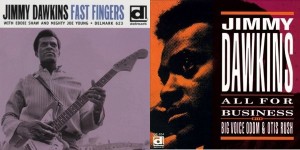Jimmy Dawkins, a prominent Chicago blues figure for over four decades, passed away April 10, 2013, at age seventy-six. Dawkins was born in Tchula, MS, but spent much of his childhood in the gulf coast area of the state, in Pascagoula, where his father was employed in shipbuilding through the years of World War II. The music of New Orleans was prominent throughout the gulf coast, and Dawkins grew up as much with that music as with traditional Mississippi blues.
Dawkins taught himself guitar, starting with a guitar that belonged to an uncle who lived with the family for a while, and in the mid 1950s moved to Chicago, playing in clubs while working a day job in a box factory. After a few years he was able to support himself with performing, and he was mentored by the great Magic Sam (Sam Maghett), who brought him to the attention of Delmark Records.
Dawkins’ 1969 debut album, recorded for Delmark, is called “Fast Fingers.” The album’s title became his nickname thereafter, though Dawkins disliked it. For one thing, although he could play fast, there were others who were faster. More importantly, his view of guitar-playing was more balanced and nuanced, and simple speed, in his thinking, was only one component of guitar mastery. He became known as an exponent of the “West Side style” of Chicago blues, more modern and urban (perhaps reflecting his New Orleans influences) than the rougher sound closely based on traditional Mississippi blues, the “South Side style.”
The “Fast Fingers” album won an award, years before the Blues Foundation was in existence with its awards, or the Grammy awards for the blues category had been created; Dawkins received a Grand Prix du Disque de Jazz from the Hot Club of France. Dawkins was not a great blues singer, and he sometimes chose to perform and record with stronger singers such as Andrew “Big Voice” Odom, who sings on his “All For Business” album on Delmark Records. His popularity in Europe was very beneficial for him when the blues scene in America went into eclipse in the 1970s and 80s and club work and recording opportunities diminished here. He played extensively in Europe, and recorded for European labels, including an album of recordings in Iceland. In the 1990s, he started recording for domestic labels again, including Ichiban, Fedora, and Earwig.
Dawkins had a fondness for unorthodox spelling; he had albums called “B Phur Real” and “Kant Sheck Dees Bluze” and spelled “guitar” in song titles variously as “gitar” and “gittar.” He felt that the spellings called attention to the songs, though some record companies “corrected” them. Dawkins liked blues to be improvisational and spontaneous, and he typically eschewed rehearsal, even in the songwriting process, which often was simply a matter of making up a title and then building the song to match it while actually recording it. To be sure, this did not result in his being one of the great songwriters of the blues, but his performances in the studio do have a fresh and uncontrived feel to them.
Dawkins put many of his songs in the names of his grandchildren so that royalties would go directly to them. He helped artists and their heirs collect unpaid royalties through his Leric Music company, and his Leric label was an avenue for him to record artists he felt deserved to be heard, including Queen Sylvia Embry, Little Johnny Christian, and Tail Dragger. In fact, one of Dawkins’ better songs, “So Ezee” (another creative spelling), has been a staple for Tail Dragger, appearing on two of his albums following his recording for the Leric label.
Dawkins wrote articles for several of the blues magazines, talking up artists he thought were deserving, and served with the planning group for the annual Chicago Blues Festival. The windy city, and the rest of the blues world, have been lucky to have his talent, energy, and love for the blues in play for all these years.



{ 0 comments… add one now }
You must log in to post a comment.